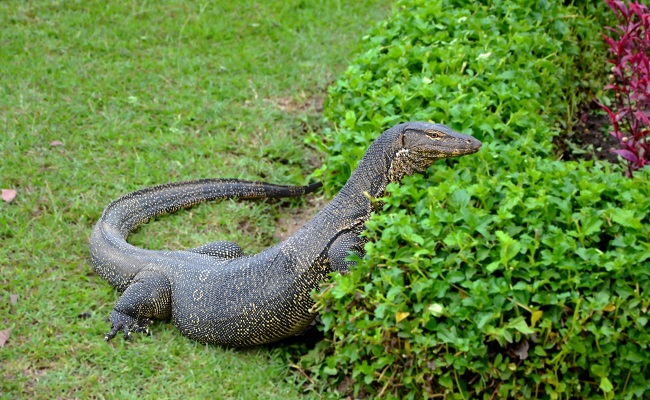The Komodo dragon, the world’s largest living lizard, has a certain allure that might intrigue adventurous individuals to fantasize about keeping them as pets. However, owning a Komodo dragon as a pet is not a viable or ethical option due to numerous reasons.
This article explores the fascinating world of Komodo dragons and why they should remain in their natural habitats or zoos rather than domestic settings.

Understanding Komodo Dragons: A Natural History
Komodo dragons, scientifically named Varanus komodoensis, are native to the Indonesian islands of Komodo, Rinca, Flores, and Gili Motang. They can grow up to 10 feet long and weigh more than 300 pounds.
Read Also:
Their diet primarily consists of carrion, but they also hunt and ambush live prey, ranging from small rodents to large water buffalos.
Why Komodo Dragons Cannot Be Kept as Pets
Here are some reasons why you can’t keep komodo dragon pet:
Size and Habitat Requirements
The sheer size and habitat needs of Komodo dragons make them unsuitable for home care. These lizards require vast areas to roam, something a household setting cannot provide.
Dietary Requirements
Komodo dragons are carnivores with a diet that’s impossible to replicate in a home setting. In the wild, they consume large amounts of meat, often feasting on carcasses.
This kind of diet is not only challenging to provide, but it’s also hazardous due to the potential spread of diseases.
Health and Longevity
Komodo dragons have a lifespan of around 30 years. They require specialized veterinary care that is typically unavailable to most pet owners. Inappropriate care and diet can lead to severe health problems and a reduced lifespan.
Legal Restrictions
It’s illegal to own a Komodo dragon as a pet. They are classified as a vulnerable species by the IUCN and are protected under Indonesian law. International trade of these animals is prohibited under the Convention on International Trade in Endangered Species (CITES).
The Ethical Perspective: Conservation Over Ownership
Komodo dragons play a vital role in their ecosystems and should ideally live in their natural habitats or recognized zoos that can provide appropriate care.
Supporting conservation efforts for these amazing creatures is far more beneficial and ethical than attempting to domesticate them for personal ownership.
Komodo Dragons: Social Behavior and Reproduction
Understanding the complex social behavior and reproductive mechanisms of Komodo dragons provides further insight into why these creatures are not suitable for home care.
Social Behavior
Komodo dragons, despite their solitary appearance, have a hierarchy that might surprise many. Dominant males often control feeding territories and regulate the access of other dragons to food.
Their intricate social behavior, which includes body language signals and a variety of vocalizations, would be nearly impossible to facilitate in a domestic setting.
Reproduction
Komodo dragons have a unique and complex reproductive process. Males engage in fierce battles for access to females during the mating season.
Females can also reproduce asexually through a process called parthenogenesis, where eggs can develop without fertilization.
This mechanism isn’t fully understood but is another fascinating aspect of their biology that emphasizes their need for specialized care.
The Importance of Komodo Dragons in Ecosystems
Komodo dragons serve as apex predators in their ecosystems, playing a crucial role in maintaining biodiversity and the health of their environment.
They help control the population of herbivores, which, in turn, impacts vegetation patterns on the islands they inhabit. This ecological balance would be disrupted if Komodo dragons were taken out of their natural habitats.
Komodo Dragon Research and Conservation
There are ongoing research and conservation efforts aimed at preserving Komodo dragons and their habitats. Scientists are learning more about their behavior, diet, and reproduction, contributing to the development of conservation strategies.
Participating in or donating to these research and conservation initiatives is a meaningful way to contribute to the survival of these magnificent creatures.
Visiting Komodo Dragons Safely
For those enamored with Komodo dragons, visiting them in their natural habitat or accredited zoos is the best way to appreciate these majestic animals.
Always remember to respect their space and observe from a safe distance under the guidance of a knowledgeable guide or zookeeper.
Key Takeaways
- Komodo dragons require a large roaming area and specialized diet, making them unsuitable for domestic ownership.
- They are a protected species, and owning them as pets is illegal.
- Conservation efforts are crucial for the survival of Komodo dragons.
Visit your local zoo or watch documentaries to learn more about Komodo dragons and other fascinating creatures in a manner that respects their nature and promotes their welfare.
Read Also:
Conclusion
While Komodo dragons might fascinate us with their size, strength, and prehistoric appearance, they are not suitable pets. They have specific needs that can only be met in their natural habitat or specialized zoos.
Instead of aspiring to own these magnificent creatures, consider supporting conservation efforts that protect their natural habitats and ensure their survival for generations to come.
























